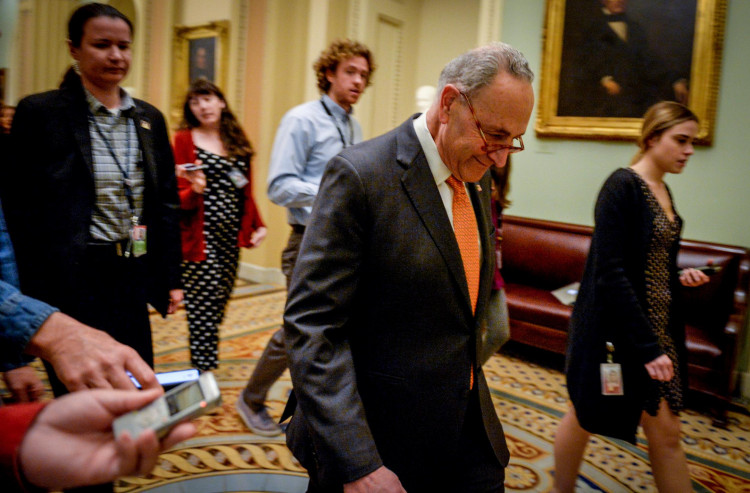With the risk of a partial government shutdown looming, Senate Democratic Leader Chuck Schumer announced on Thursday that the Senate would begin working on temporary spending legislation to avert a shutdown before the start of the new fiscal year on October 1. "Time is not a luxury that Congress has right now," Schumer said during a floor speech, emphasizing the urgency of reaching a bipartisan agreement that could gain support from both Republicans and Democrats in the Senate.
The U.S. Congress has just days to pass a spending bill to avoid the furlough of thousands of federal workers and the disruption of a wide range of government services. As the November 5 elections approach, the issue has taken on added significance, as both parties scramble to navigate the political and economic consequences of a shutdown.
In the House of Representatives, Speaker Mike Johnson has struggled to unify his Republican caucus after a GOP-led bill that proposed a six-month funding extension was defeated on Wednesday. That bill also included controversial election-law changes, known as the SAVE Act, which were strongly opposed by Democrats. Johnson, undeterred by the setback, vowed to try again with a new plan but has yet to provide specifics.
"We'll come up with a solution," Johnson said after the defeat. "I'm already talking to colleagues about their many ideas. We have time to fix the situation, and we'll get right to it." However, with just days remaining before the deadline, his path forward remains unclear.
The two parties are deeply divided over how long the stopgap funding should last. Johnson's six-month proposal was intended to push any further negotiations into next spring, potentially allowing Republicans to revisit the issue after the 2024 elections. In contrast, Democrats have pushed for a shorter three-month extension, aiming to keep the issue under their control while President Joe Biden remains in office and Democrats retain a slim majority in the Senate.
A longer extension, Democrats argue, could prevent government agencies from initiating critical projects, particularly within the Department of Defense, which requires updated funding to launch new initiatives. Schumer expressed frustration with the House's inability to pass a funding plan, stating, "House Republicans don't seem to have any plan for actually keeping the government open, so the Senate will step in."
Senate Republicans are also showing signs of impatience with their House colleagues. Senate GOP Whip John Thune suggested the House might take the lead on the next round of negotiations, saying, "My guess is the House will now, I hope, move to Plan B and give us something to work with." Thune added that timing would be critical, hinting that the House should act "early next week in time for us to act."
Despite the uncertainty surrounding Johnson's next move, Schumer took a procedural step on Thursday to position the Senate for a possible vote next week. The Senate's bill is expected to be a short-term continuing resolution aimed at keeping the government funded temporarily while negotiations continue. "Both sides are going to spend the next few days trying to figure out the best path remaining for keeping the government open," Schumer said.
The roadblock in the House stems from the inclusion of the SAVE Act, a measure that would restrict non-citizen voting in certain local elections. The proposal, championed by Trump and his allies, has become a point of contention within the Republican Party. Former President Donald Trump has urged GOP lawmakers to hold firm on the issue, even if it means a shutdown. "If Republicans don't get the SAVE Act, and every ounce of it, they should not agree to a Continuing Resolution in any way, shape, or form," Trump wrote on his social media platform, Truth Social.
However, many Republicans appear wary of embracing Trump's stance. A shutdown could backfire politically, with voters blaming Republicans for the impasse. Schumer pointedly criticized Trump's influence over the process, saying, "Many Republican House members are smart enough to know if there is a shutdown, it will be a Republican shutdown. And they realize that Donald Trump, when it comes to legislating, doesn't know what the heck he's talking about."
Echoing Schumer's concerns, Senate Majority Whip Dick Durbin expressed his frustration with the recurring brinkmanship in Congress. "There will not be a shutdown. There never is a shutdown - hardly ever is a shutdown," Durbin said. "But the fact that we have to come to the brink so many times is really embarrassing to the Congress."
The ongoing stalemate between the House and Senate leaves the federal government on the verge of a shutdown, with neither chamber taking decisive action yet. Johnson's next move remains uncertain, and whether he can unify his party around a new plan in time is unclear. Meanwhile, the Senate is preparing its own stopgap bill in an effort to avert a fiscal crisis, but time is running out.






